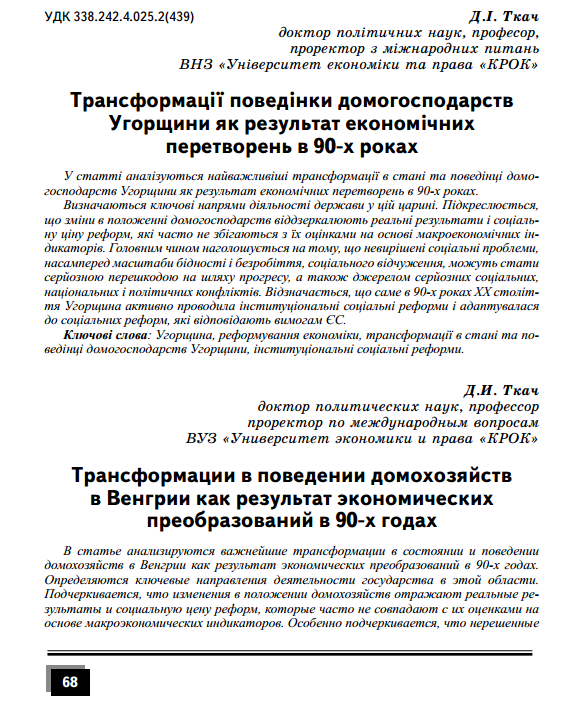Transformation of the behavior of Hungarian households as a result of economic transformations in the 1990s
DOI:
https://doi.org/10.31732/2663-2209-2017-48-68-77Keywords:
Hungary, reforming of economy, transformation in the state and behavior of households in Hungary, institutional social reforms., institutional social reformsAbstract
The article analyzes the most important transformations in the state and behavior of households in Hungary as a result of economic transformations in 90s. The key directions of state activity in this area are determined. It is emphasized that changes in the situation of households refl ect the real results and the social price of reforms, which often do not coincide with their estimates based on macroeconomic indicators. Particular emphasis is placed on the fact that unresolved social problems, especially the extent of poverty and unemployment, social exclusion, can become a serious obstacle to progress, source of serious social, national and political confl icts. It is noted that it was in 1990s that Hungary actively pursued institutional social reforms and adapted to social reforms that would meet EU requirements.
Downloads
References
Кіш Є. Б. Центральна Європа в сучасній системі єврорегіональної інтеграції : [монографія] / Єва Кіш. – Ужгород : Ліра, 2008. – 440 c.
Ткач Д. І. Сучасна Угорщина в контексті суспільних трансформацій: Монографія / Ін-т політ. і етнонац. дослідж. НАН України. – К. : МАУП, 2004. – 504 с.
Дж. Сакс, О. Півоварський. Економіка перехідного періоду // Уроки для України). – Київ, «Основи» – 1996. – 159 с.
Kuczi Tibor. Kuczi, Tibor. Kisvállalkozás és társadalmi környezet / Small entrepreneurship and social environment). – Budapest: Replika, 2000.
Ласло Сюч, Ласло Соч. 2001 год в Венгрии: Движение вперед, но к чему? – Режим доступу : www/gallup.hu
Róna-Tas, Ákos Róna-Tas, Ákos. Economic Sociology in Europe: Hungary, Economic Sociology. European Electronic Newsletter (February 2002). –Vol. 3. – No. 2. – http://www.siswo.
uva.nl/ES/esfeb02art4.html
Лучкина, Л. С. Социальные реформы в Содружестве Независимых Государств : науч.
докл. / Л. С. Лучкина // Рос. акад. наук. Ин-т междунар. экон. и полит. исслед. – М. : ИМЭПИ РАН, 2002. – 95 с.
М. А. Усієвич. М. А. Усиевич. Десятилетие реформ в Венгрии. 90-е годы ХХ в. / «Новая и новейшая история». – 2002-09-01NNI-No. 005. – С. 86.
Ежегодный бюллетень жилищной и строительной статистики для Европы и северной Америки, 1998. – Нью-Йорк, Женева, ООН. – 1998. – С. 79.
Временные руководящие принципы по статистике распределения доходов, потребления и накопления домашних хозяйств // ООН, Нью-Йорк. – 1977. (Перепечатано в Экспресс-информации № 4 серии: Обследование бюджетов семьи и методы исчисления, М., 1990, Госкомстат СССР и НИИ статистики).
Nelson M. Tilly Ch., Walker I. Transforming Post-Communist Political Economies. – Washington, DC., National Academy Press. – p. 249.
Д. Ткач. Адаптація населення Угорщини до життя на мікрорівні в умовах глобалізації, 2002 / Діалог цивілізацій: Нові принципи організації світу : матеріали другої всесвітньої конференції. – К. : МАУП – С. 116–128.
Статистичний щорічник України за 2000 рік. – Київ, Техніка. – 2001. – С. 378.
Roggemann C. H., Scholz О., Tomann H. Welfare States in Transition: East and West. / Macmillan Press LTD, 1999. – p. 96 4 Ibid., p. 93.
Magyar statisztikai evkonyv. – 2000, Budapest.

Downloads
Published
How to Cite
Issue
Section
License
Copyright (c) 2018 Science Notes of KROK University

This work is licensed under a Creative Commons Attribution-NonCommercial 4.0 International License.

